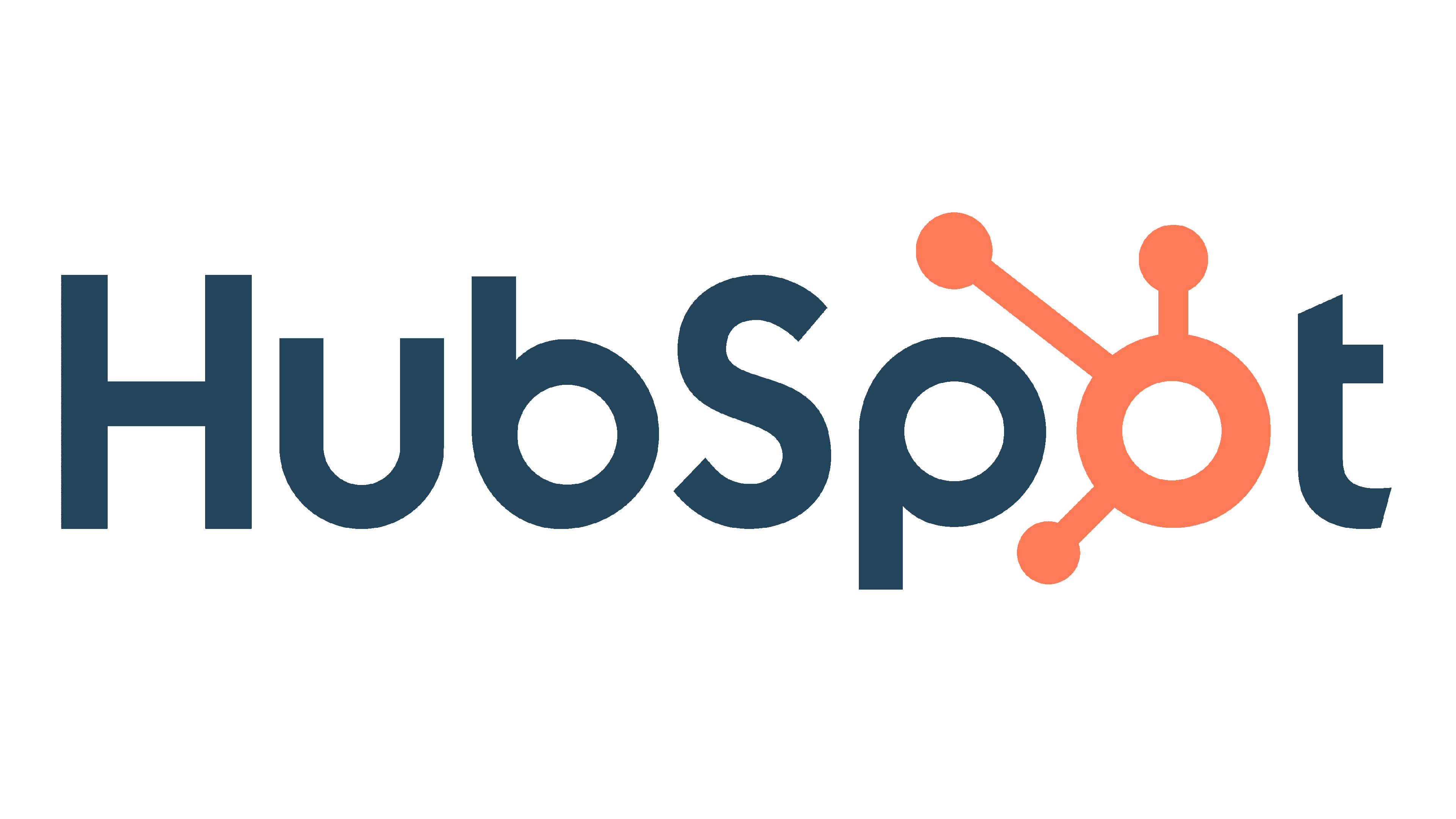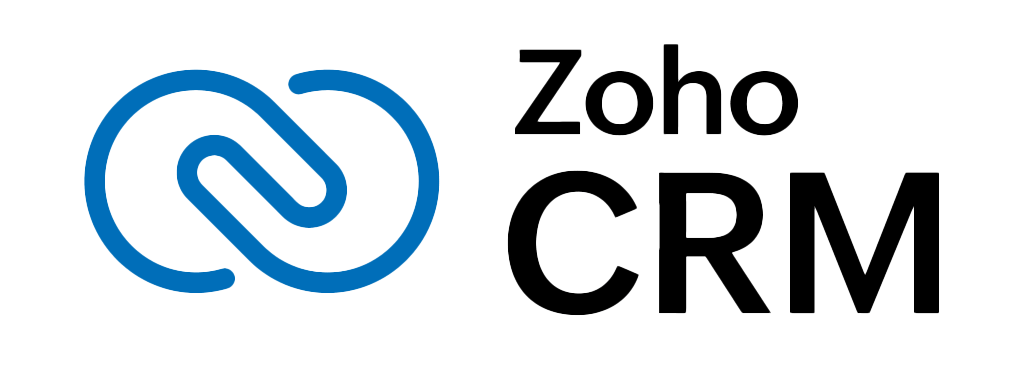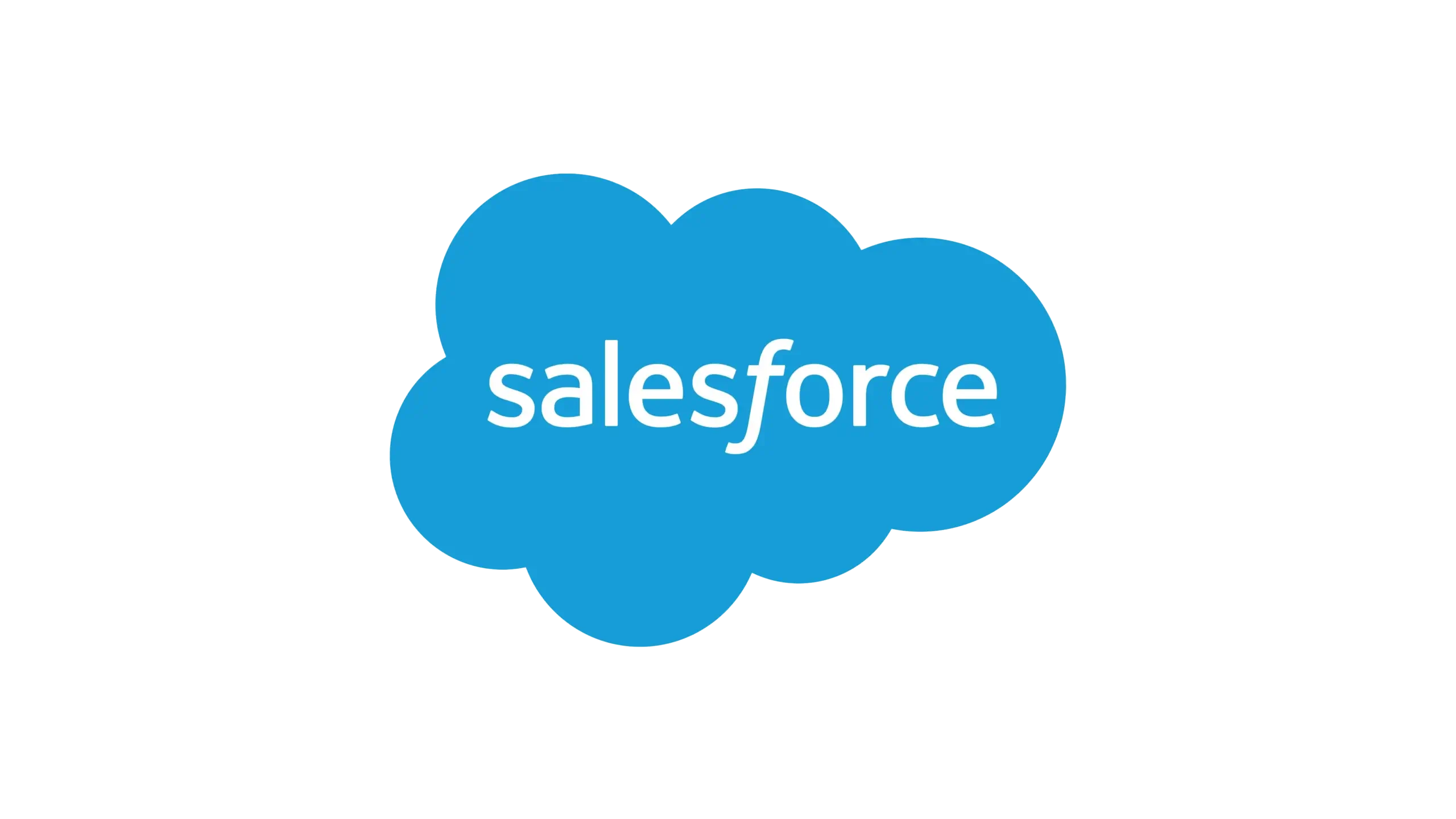
Introduction
If you’re working in real estate, you already know how crucial relationships are. But keeping up with hundreds of leads, listings, and follow-ups? That can quickly get overwhelming.
That’s where real estate CRM software steps in. A CRM (Customer Relationship Management) system helps you organize client data, automate routine tasks, and stay on top of every deal. Whether you’re a solo agent or running a large brokerage, using the right CRM can seriously boost your efficiency, save time, and even help close more deals.
In this guide, you’ll find the best real estate CRMs for 2025, along with expert insights to help you pick the perfect one for your business.
What Is a Real Estate CRM?
A real estate CRM is a software tool designed to help real estate professionals manage leads, clients, properties, and communication – all in one place.
Unlike general CRM tools, a real estate CRM includes features tailored specifically for agents and brokers, such as:
-
Lead Management: Capture, track, and nurture leads from multiple sources.
-
Property Listings Integration: Organize listings and match them with client preferences.
-
Automated Workflows: Send follow-ups, schedule appointments, and update client status automatically.
-
Client Communication Tools: Built-in email and SMS tools help you stay connected.
-
Pipeline Tracking: Visualize your deals from initial contact to closing.
If you’re still using spreadsheets or juggling multiple tools, upgrading to a CRM designed for real estate can transform how you work. It gives you back time and keeps your pipeline flowing smoothly.
In the next section, we’ll explore the top features to look for in a real estate CRM, and why they matter for your business.
When choosing a CRM, factors like business size, specific features, budget, and customization options play a crucial role. Each real estate business is unique, and the right CRM should meet its specific demands while providing flexibility for growth.
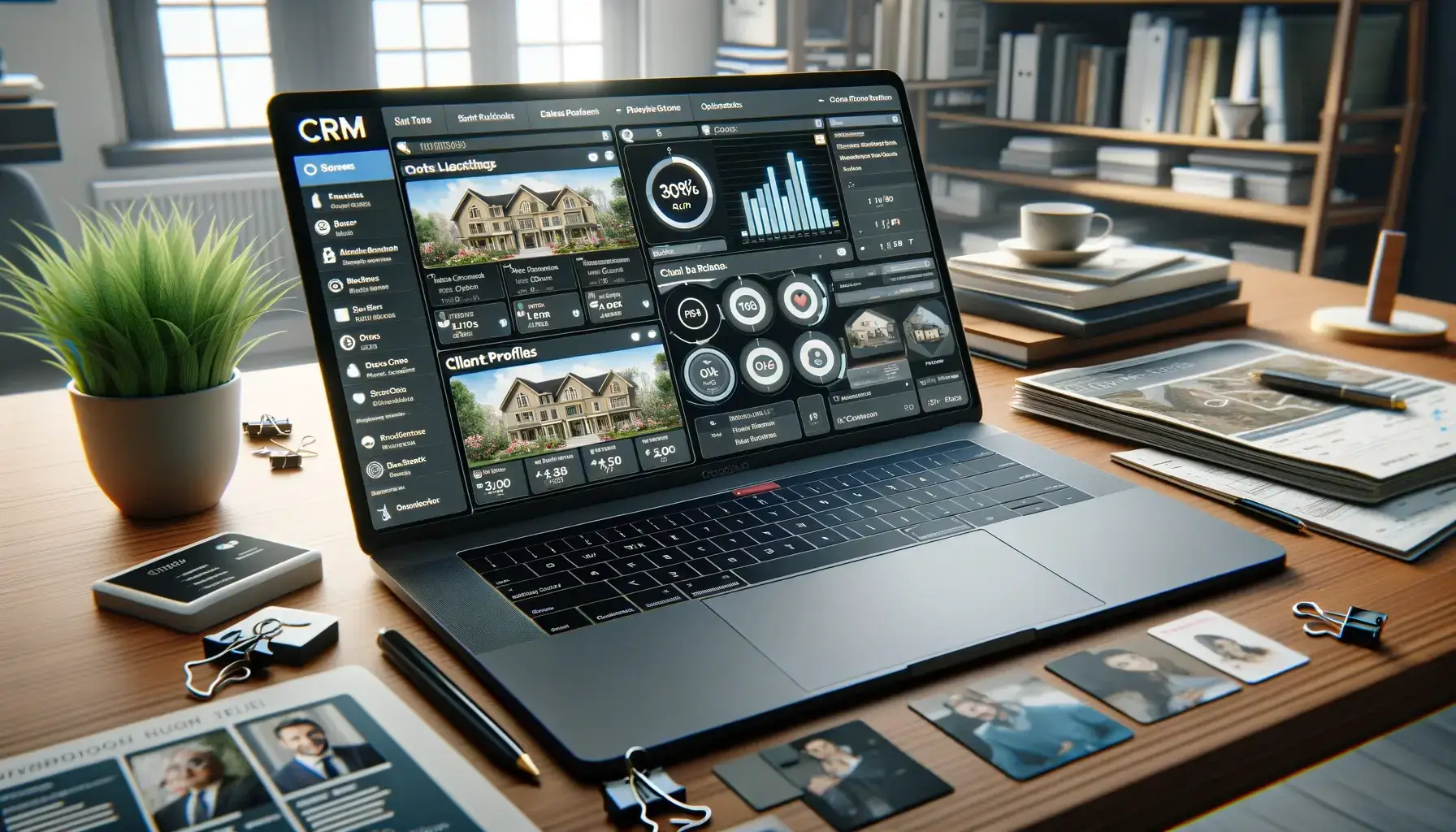
Key Features to Look for in Real Estate CRM Software
Not all CRMs are created equal. When you’re choosing a real estate CRM, you’ll want to look for features that actually support the way you work. Here’s what to prioritize:
1. Lead and Contact Management
This is the heart of any good CRM. You should be able to easily capture leads from your website, landing pages, or social media, and keep all their contact info, preferences, and communication history in one place.
2. Property Listings and Matching
A strong real estate CRM lets you upload or sync listings and match them with your clients based on their budget, location, and needs. This saves you hours of back-and-forth.
3. Automated Follow-Ups
You shouldn’t have to remember every email or phone call. Good CRMs let you set up automated workflows so your leads never go cold.
4. Communication Tools
Built-in email and SMS tools make it easier to stay in touch. Some CRMs even track opens and clicks, so you know who’s engaging with your content.
5. Pipeline and Deal Tracking
See exactly where each client is in the sales funnel. Visual dashboards help you prioritize and push deals forward.
6. Reporting and Analytics
Understand what’s working and what’s not. Reporting features show you where your leads are coming from, how long it takes to close a deal, and more.
7. Mobile Access
You’re not always at your desk. A mobile-friendly CRM ensures you can update records, respond to leads, and check your calendar while you’re out showing properties.
8. Integrations
The best CRMs play well with your existing tools, email marketing platforms, MLS databases, calendar apps, and more.
With these features in mind, you’re better equipped to choose a platform that actually helps you work smarter, not harder.
Top Real Estate CRM Software Solutions for 2025
Now that you know what to look for, let’s explore the best CRM software for real estate professionals in 2025. Each of these tools has been handpicked for its real estate-friendly features, usability, and value for money.
Monday CRM is built for flexibility, making it the ideal choice if you want to customize how your workflows and pipelines function.
Why it’s great for real estate: You can create tailored pipelines for sales stages, client onboarding, or property management. With visual boards and drag-and-drop functionality, tracking leads and deals becomes incredibly intuitive.
- Customizable sales workflows
- Visual pipeline tracking
- Automation for repetitive tasks
- Integration with MLS and email platforms
- Easy team collaboration
Best for: Real estate teams that want an adaptable and visual CRM
Starting price: $10/user/month with a free trial available
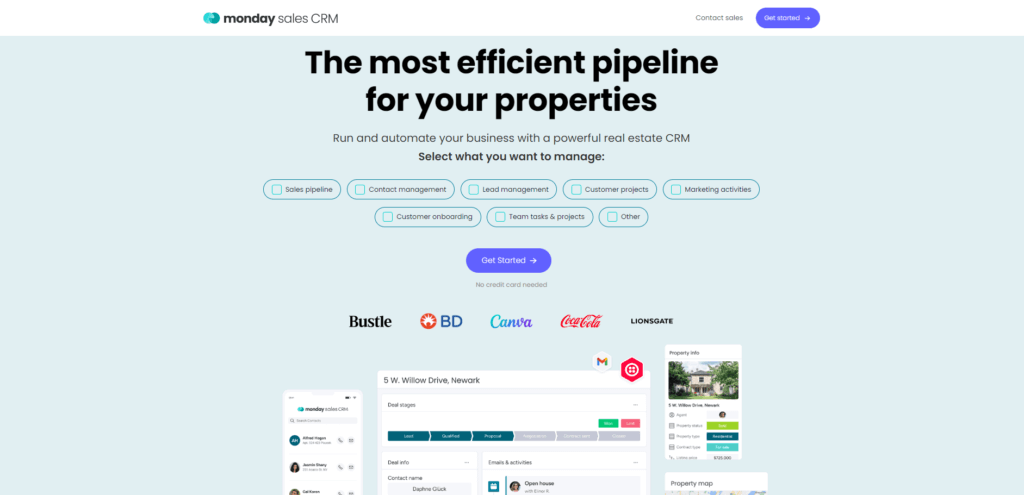
Pipedrive is laser-focused on helping agents stay organized and close more deals. Its visual sales pipeline helps you track every stage of the client journey.
Why it’s great for real estate: You get real-time activity tracking, customizable pipelines, and smart automation to follow up with leads faster.
- Drag-and-drop deal stages
- Activity reminders and scheduling
- Customizable fields for property details
- Powerful mobile app for agents on the go
Best for: Agents who want a simple but powerful sales CRM
Starting price: $14.90/user/month with a free trial
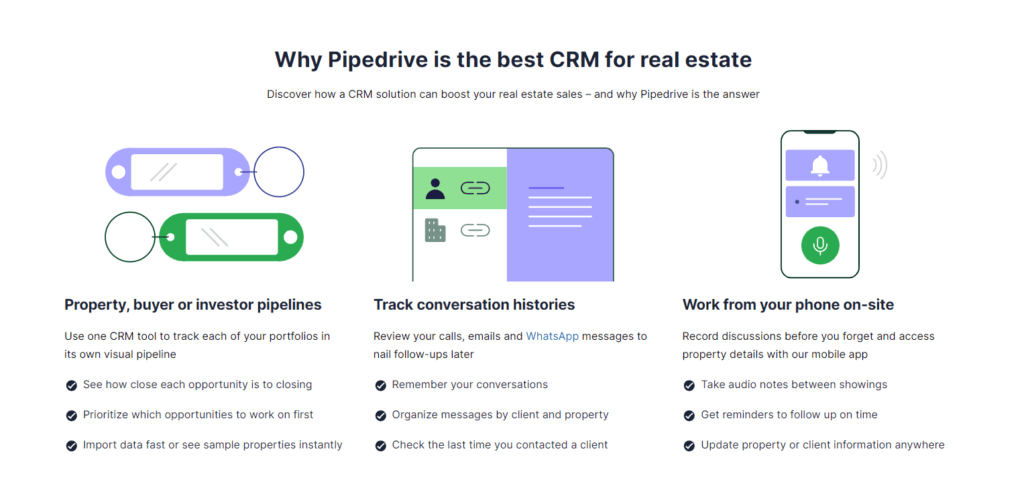
HubSpot is a standout if you’re heavily focused on marketing. It combines CRM features with a powerful marketing suite.
Why it’s great for real estate: From email campaigns to lead capture forms, HubSpot makes it easy to manage your pipeline and marketing in one place.
- Free core CRM with optional paid add-ons
- Strong marketing automation tools
- Customizable contact records
- Reporting dashboards and email tracking
Best for: Agencies focused on inbound marketing and lead generation
Starting price: Free (core CRM), with paid upgrades available
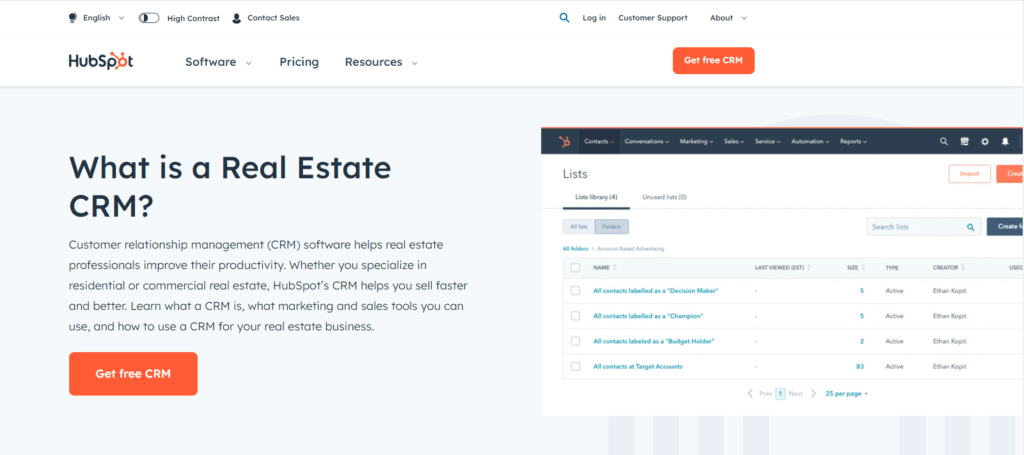
Zoho CRM blends affordability with advanced tools like artificial intelligence. It’s a great fit if you’re looking for smart automation without breaking the bank.
Why it’s great for real estate: AI assistant Zia gives you lead predictions and workflow suggestions. It also integrates well with other real estate tools.
- Lead scoring and AI recommendations
- Workflow and task automation
- Email and SMS integration
- Custom dashboards and reports
Best for: Small teams looking for powerful tools on a budget
Starting price: $12/user/month with a free trial
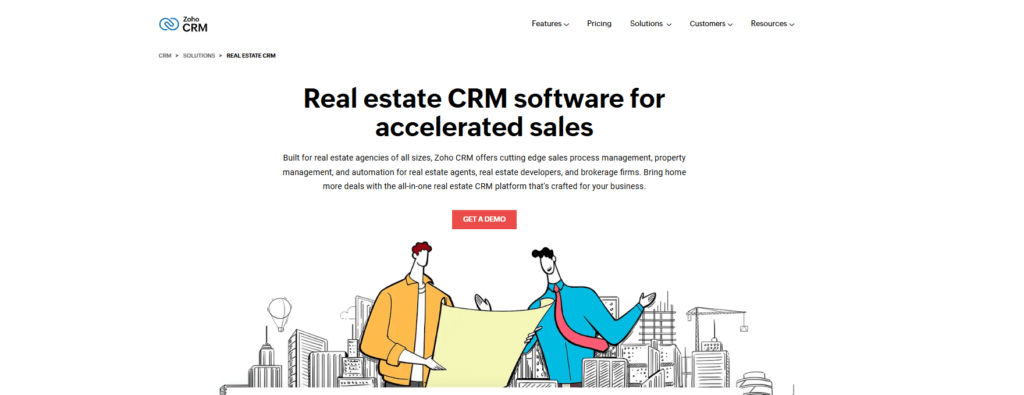
Salesforce is the most scalable option on the list. If you run a large team or multi-location brokerage, it has the power and flexibility you need.
Why it’s great for real estate: With advanced customization, AI, and third-party integrations, Salesforce can grow with your business.
- Highly customizable CRM modules
- Einstein AI for insights and automation
- Comprehensive analytics and dashboards
- Integration with nearly every platform you use
Best for: Large brokerages or teams with complex workflows
Starting price: $25/user/month, with various plans available
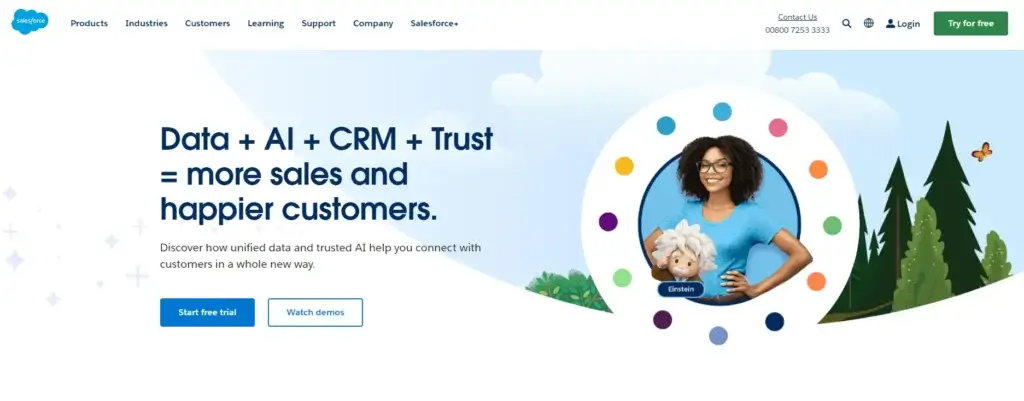
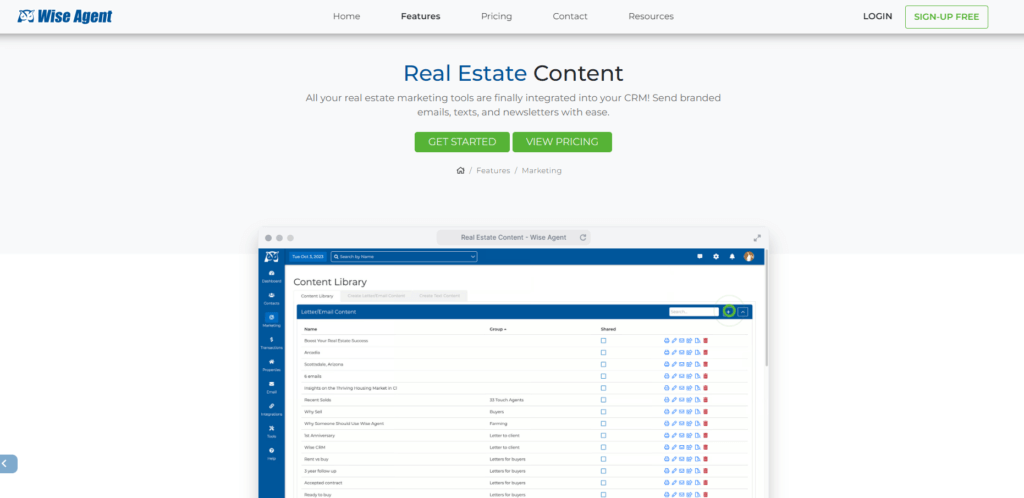
How to Choose the Right CRM for Your Real Estate Business
Choosing the best CRM depends on more than just features. You need to consider how well it fits your team, your daily workflow, and the long-term goals of your business. Here’s how to make the right call:
1. Define Your Business Needs
Are you a solo agent juggling leads on your own? Or are you managing a growing team? Think about what problems you need to solve. For example:
- Need to automate follow-ups? Look for strong workflow tools.
- Want to improve team collaboration? Choose a CRM with task sharing and role-based access.
- Managing lots of listings? Prioritize listing integration features.
2. Evaluate Ease of Use
Even the most powerful CRM won’t help if your team avoids using it. Look for clean, user-friendly interfaces and simple navigation. A quick onboarding experience matters, especially if you’re transitioning from spreadsheets or another CRM.
3. Consider Integration Options
Your CRM should connect easily with your existing tools, like Gmail, Outlook, MLS platforms, or your website. Integrations help eliminate manual data entry and keep everything synced.
4. Check Support and Training
Look for CRMs that offer solid support resources: live chat, knowledge bases, webinars, or even one-on-one onboarding. You want help to be available when you need it.
5. Plan for Growth
Your business might be small now, but what about next year? Choose a CRM that can grow with you. That means scalable pricing plans, customizable modules, and strong reporting tools.
Tips for a Smooth CRM Implementation
Even the best CRM won’t deliver results without the right setup. Here are some practical steps to make your CRM rollout successful:
1. Set Clear Goals
Before you roll out your CRM, define what success looks like. Is it faster response times? Better lead conversion? Knowing your goals helps shape how you use the system.
2. Clean Up Your Data
Garbage in, garbage out. Take the time to organize your existing contact list, remove duplicates, and standardize your fields before importing anything into your new CRM.
3. Train Your Team
A short training session goes a long way. Show your team how to log calls, update statuses, and use the automation tools. Make it part of their daily routine.
4. Start Simple, Then Expand
You don’t need to use every feature on day one. Start with the basics, like contact tracking and email templates, then roll out more advanced tools like reporting or automation.
5. Review and Adjust Regularly
Check in after a few weeks. Are your workflows running smoothly? Is your team using the CRM? Use feedback to fine-tune the setup and keep improving.
Conclusion
The real estate CRM landscape is constantly evolving, driven by technological advancements and shifting market demands. Choosing the right CRM can dramatically enhance your team’s efficiency, boost client satisfaction, and position your business for growth.
Summarizing the Top Choices
- monday CRM: Perfect for teams needing customizable workflows and collaboration tools.
- Pipedrive: Ideal for sales-focused operations with a strong emphasis on pipeline management.
- Zoho CRM: A budget-friendly option offering AI-powered tools for diverse teams.
- HubSpot: Exceptional for agencies prioritizing marketing integration and user-friendly design.
- Salesforce: The ultimate choice for scalability and advanced analytics.
- Wise Agent: Tailored for real estate professionals needing transaction-specific features.
For more detailed information and a broader comparison of top CRM software options, this resource can provide further insights.
Anticipating Future Developments in CRM Technology
The future of CRM in real estate is likely to be shaped by several key trends:
- Artificial Intelligence and Machine Learning: AI and ML are expected to play a larger role in CRM software, offering predictive analytics, intelligent automation, and enhanced personalization in customer interactions.
- Integration with Emerging Technologies: Integration with emerging tech like virtual reality for property tours, blockchain for secure transactions, and IoT for smart home data can provide more comprehensive solutions.
- Mobile and Remote Accessibility: As remote work continues to rise, CRM solutions that offer robust mobile platforms will become increasingly important.
- Focus on Customer Experience: Enhanced tools for improving customer experience, such as personalized communication and improved customer journey mapping, are likely to be a focus.
- Data Security and Privacy: With increasing data regulations, CRMs will need to prioritize security features and compliance with privacy laws.
In conclusion, as we look towards the future, it’s clear that real estate CRM software will continue to evolve, integrating new technologies and adapting to the changing landscape of the real estate industry. Real estate professionals should stay informed about these developments to ensure that they are leveraging the best tools available to grow their businesses and provide exceptional service to their clients.
FAQ
What is Real Estate CRM Software?
Real Estate Customer Relationship Management (CRM) software is a tool designed to help real estate professionals manage interactions with clients, streamline transactions, and efficiently track leads and sales processes.
Why is CRM important in real estate?
CRM is vital in real estate for organizing client data, automating marketing efforts, managing property listings, and enhancing customer relationships, ultimately leading to increased sales and improved client satisfaction.
How long does it take to set up a CRM?
Setup can take a few hours to a few days, depending on your needs and the complexity of your data. With a clear plan and the right support, you’ll be up and running quickly.
Do I really need a CRM as a solo agent?
Yes. Even if you’re working alone, a CRM can save you hours every week by automating follow-ups, organizing contacts, and keeping you focused on what matters most: closing deals.
Can I integrate my CRM with MLS?
Many CRMs offer MLS integration, especially real estate-specific platforms like Wise Agent or monday.com. Always check for compatibility with your region’s MLS provider.
What is the best CRM for small real estate teams?
For small teams, Zoho CRM offers a great mix of features and affordability. If you need strong workflow tools and collaboration, monday.com is another excellent choice.
How do I transition to a new CRM system?
Transitioning to a new CRM system involves data migration, training staff on the new system, setting up the necessary integrations, and gradually phasing out the old system to ensure a smooth transition.
Are there any budget-friendly CRM options for real estate?
Yes, there are budget-friendly CRM options like Capsule that offer essential functionalities at an affordable price, making them suitable for small businesses or individual agents.
What’s the biggest benefit of using a CRM in real estate?
Consistency. A CRM ensures that no lead falls through the cracks, every client gets timely follow-ups, and your entire process becomes more efficient and scalable.
Will CRM software evolve with the real estate market changes?
Yes, CRM software typically evolves with market changes, integrating new technologies and adapting features to meet the evolving needs of the real estate industry, such as AI, mobile accessibility, and enhanced customer experience tools.



